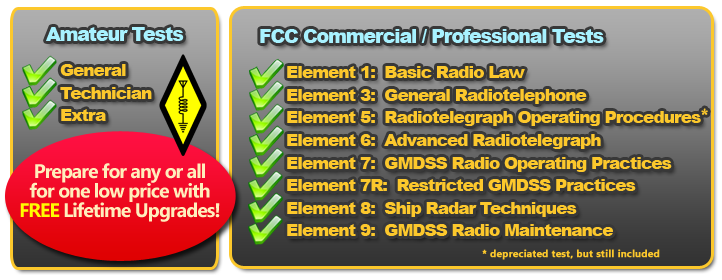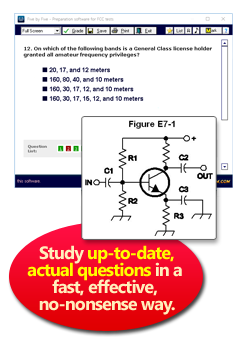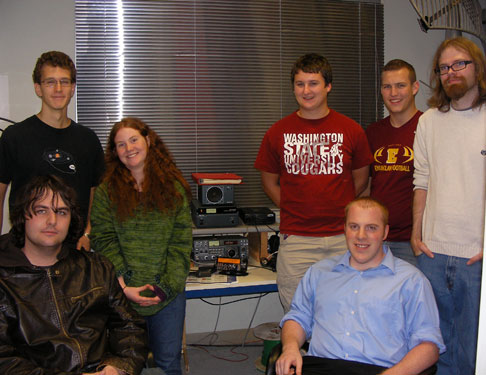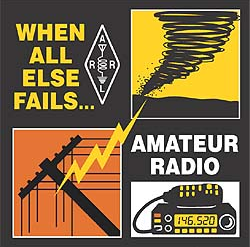|
Does
this software / app work for US Coast Guard (USCG) GMDSS Exams?
Yes!
- Just prepare for either Maintainer or Operator, as required.
The Coast Guard GMDSS exams are the same as the FCC ones.
Just make sure when you purchase you select a package that includes the Commercial exams as the GMDSS exams are part of our FCC Commercial package.
Will
Five by Five prepare me for the GROL license that I need to be
an avionics technician?
It
sure does. Having a GROL is an easy and useful add-on for any
aviation mechanic. With a bit of study, in our experience and in the experience of many of our users, you could be ready for
the GROL in under a day's sitting with Five by Five.
Does
Five by Five include all of the charts and figures I will need?
Absolutely.
Everything's included in the download.
What's the difference between the Five by Five software / apps and the audio preparation?
"Five by Five Audio" is our series of audio preps for the FCC commercial and amateur tests. The same basic material is covered in both the software/apps and the audio preps,
though the software/apps have slightly more questions, as some questions with a large visual or calculative element are not included in the audio preps.
The advantage of the audio preps is, for example, that you can burn the audio prep to a CD for listening to in the car or copy them to your iPod for listening elsewhere. '
Many users get both the software and the audio prep to help minimize their study time. The audio prep can be purchased instead of or together with the software/apps - there
is on most platforms a discount for getting both, though to get this you must either purchase the software first and then the audio or both at the same time -
there is no discount if you purchase the audio first and then decide to purchase the software later. To learn more about Five by Five audio, click here.
What
about printouts?
In the PC version, you
can print out the charts and figures. You can print out the questions.
You can print out result sheets to show your friends. You can
even print out lists of questions in a "book" form to
study from when you're away from the computer.
The iOS and Android versions allow you to read PDFs of the figures which you might be able to print out, though printing from those platforms is a bit nonstandard.
Why
is it so expensive?
Expensive?
Compared to free web sites that offer a sloooooooooooooooooooooooooooooooooooooooooow HTML interface, perhaps.
But Five by Five is very reasonably priced compared to all other
books and software that we've seen. This software took hundreds
of hours to write - your payment of our modest fees helps pay
for things like programming tools and bandwidth, but you get in
exchange a tool that is ideal for fast and efficient study - much
more so than some website that only seems cheap until you start
using it.. and the hours drain away.. ever so slowly.. because
you can learn so many more questions in a short amount of time
with Five by Five than any HTML-driven website.
Our software and mobile apps are serious things - not amateur efforts. What you're getting there is an exceptionally
polished user experience optimized to help you study and learn FAST. It pays for itself in saved time and frustrtation in no time.
Why
is it so cheap?
If
we were out to make serious money, we'd be in a different line
of business. We do this because we enjoy it. Hey, don't ask questions
like this - just enjoy.
I
worry about paying online by credit card
No
problem - simply start the order process online. At one point,
you will get to a screen that asks you your payment method - you
will have a choice there of paying by alternate means (non-credit
card) and/or completing your order (telling the sensitive bits)
by telephone. That said, please recognize that in over a decade
of business we have had zero credit-card purchase related irregularities
over our secure server, and this really should be the best way
for most people to purchase the software.
Where
are the explanations?
Five
by Five is not intended to have direct explanations for each questions. Rather, it
simply presents the questions in a convenient, highly customizable
manner that has been designed to implant the correct answers
in your brain. After using this program for a while, the correct
answers will start to leap out at you so that in a great many
cases you won't even have to read the questions. Actually, at
one point, we considered making a version with explanations. This
would be a LOT of work (as you might imagine - there are several
thousand questions). To our great surprise, when we polled our
existing users, the overwhelming consensus was that while explanations
might be nice, not having them was just fine as those who wanted
to really learn the stuff had supplementary material anyway, and
for those who just wanted to learn the tests, what we offer is
more than sufficient.
That said, 5x5 also features an integrated "JargonBuster" dictionary. What this is a massive collection of over 5000 ham radio and commercial radio terms and definitions. When you encounter difficult terms in the app,
it presents you the opportunity to see the definition without losing your place. In practice, the definitons provided amount to detailed explanations for a significant percentage of the quesions. The definitions feature
is very neat. While it is quite new at the time of this writing, we're getting a ton of positive feedback from our users on this. Suffice it to say, none of our competitors have anything even remotely like this.
Can
I install the PC software on two machines?
When
you register the PC software, you get a personal license to it -
this means that you can use it on more than one machine (say,
your laptop and desktop) -- as long as it's for YOUR PERSONAL
USE ONLY. Please don't let others use your unlocked codes or the
software that has been unlocked in your name. We hope you find
this arrangement fair.
There's
a typo or other error ...
Don't
fret - just let
us know about it and we'll take care of it for a future edition.
We're generally quite speedy about taking care of such things
once somebody lets us know about them. If you have an issue with
a particular question, Five by Five features a built-in question
issue reporter so that you can let us know about it quickly and
easily. In the "Classification" pane, you will see a
web link. If you have an issue with a particular question, click
as seen below to take you to the problem report page for that
question - this will communicate with our back-end systems quickly
so that the issue can be looked into ASAP.
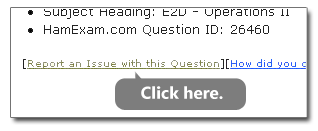
My
registration key doesn't work / I've lost my registration code
/ I want to upgrade to the current version!
Please visit our Unlock Help Wizard for assistance.
.
Is
this Software available on CD-ROM?
Unfortunately,
no. Not at this time and it is unlikely to be in the future.
Who
are you guys, anyway?
Just
some guys who like Ham Radio and Airplanes. We're scattered throughout
the USA. We've been making this software and keeping it up to
date since 1996.
How
can I contact you?
Visit
our helpdesk, and go from there. This is good for technical support,
pre sales questions, and anything else you can think of!
What
happens when new test pools come out?
If
history is any guide (and it usually is), we'll update the Five by Five
soon-after. Software upgrades are always free to registered users.
We have provided the latest official available test pools to our users within a week of their release, and usually considerably sooner, with every change to FCC Commercial and Amateur Radio tests
from 1998 to today. During periods when a test changeover is coming to a new test bank, we generally keep both the current and imminent test banks active in our products at the same time so that users
can choose what to study based on their test dates.
We work hard to keep the software up to date so you have peace of mind!
Tell
me more about the tests.
Hey,
that's not a question! But, here's some general info anyway:
Five by Five will help you prepare for your FCC Amateur and Commercial written exams in the quickest and most painless way possible. Many people are able to be ready for their tests in only an evening or two of study with our software.
The software itself should be rather straightforward to use - simply select the test you're interested in studying for, select the chapters you want to concentrate on, and then select your study or learning mode. There are numerous options that allow you to customize the study, learning, and testing features to suit your best. These should more or less be self-explanatory, but you can also click on the little question mark buttons throughout the software for help with specific items. We have occasionally been asked "what is the best or recommended method to use to learn the material quickly?" There really is no such thing - while we do provide a series of "quick settings" buttons on the test options screen that progress from learning the material through various training modes and finally through simulated exam modes. This can be a reasonable way of studying, but it's just one of many - there is no "right"or "best" way. Please experiment so that you find a mode that works for you!
Yes! this software is 100% what you need to take and pass your FCC written tests (also known as "written elements"). You do not need additional materials to study for and to pass your FCC amateur and/or commercial written tests. This software has helped hundreds of people and will work great for you.
The questions provided by Five by Five are ACTUAL FCC QUESTIONS. They are regularly updated by our editorial staff. To make sure that you have the latest available version of the software and its data, click on 'Program Updates Check' from the main menu and use the built-in self-update tool. It is recommended that you do this regularly - while the questions don't tend to change too often, it never hurts to be sure.
This software features LIFETIME FREE UPDATES to registered users in good standing. What this means is that, for example, if you are planning on doing your Amateur (Ham Radio) exams now, you can take the Technician exam now, and when you're ready for the General or Extra, simply use the built-in self-update and study as you need to. The software is ready for you!
If you need help with our software, please visit our online helpdesk.
Notice: much of the information taken below is taken directly from the FCC. However, this information is potentially subject to change without notice. Please visit the FCC's website for canonical information. Should you find deficiencies or out of date information in this document, please let us know via our helpdesk Thank you.
Amateur ("Ham Radio") Exams and Licensing
Technician, General, and Amateur Extra Classes
The amateur and amateur-satellite services are for qualified persons of any age who are interested in radio technique solely with a personal aim and without pecuniary interest. These services present an opportunity for self-training, intercommunication, and technical investigations. Twenty-seven small frequency bands throughout the spectrum are allocated to this service internationally. Some 1,300 digital, analog, pulse, and spread-spectrum emission types may be transmitted.
Millions of amateur operators in all areas of the world communicate with each other directly or through ad hoc relay systems and amateur-satellites. They exchange messages by voice, telephoning, telegraphy, facsimile, and television. In areas where the FCC regulates the services, an amateur operator must have an FCC or Canadian license. FCC-issued Reciprocal Permit for Alien Amateur Licensee are no longer needed. Reciprocal operation in the U.S. is now authorized by Section 47 C.F.R. ?? 97.107.
All frequencies are shared. No frequency is assigned for the exclusive use of any amateur station. Station control operators cooperate in selecting transmitting channels to make the most effective use of the frequencies. They design, construct, modify, and repair their stations. The FCC equipment authorization program does not generally apply to amateur station transmitters.
Classes of License?
The FCC issues six license classes, each authorizing varying levels of privileges. The class for which each licensee is qualified is determined by the degree of skill and knowledge in operating a station that the licensee demonstrates during an examination to volunteer examiners (VEs) in his or her community. Operator class license classes are:
The current classes are: Technician, General, and Extra (also known as "Amateur Extra".
- Technician Class: The privileges of a Technician Class operator license include operating an amateur station that may transmit on channels in any of 17 frequency bands above 50 MHz with up to 1,500 watts of power. To pass the Technician Class examination, at least 26 questions from a 35 question written examination must be answered correctly. Technician Class licensees also have privileges in four amateur service bands in the HF range (3-30 MHz) (Refer to Section 97.301(e)).
- General Class: The General Class operator license authorizes privileges in all 27 amateur service bands. Upon accreditation by a Volunteer-Examiner Coordinator (VEC), an individual can help administer certain examinations. In addition to the above written examination, the requirement for a General Class operator license includes a 35 question written examination for which 26 correctly answered questions is the minimum passing score.
- Amateur Extra: The privileges of an Amateur Extra Class operator license include additional spectrum in the HF bands. In addition to the two above written examinations, the requirement for an Amateur Extra Class operator license includes answering correctly at least 37 questions on a 50 question written examination.
Additionally there are a few grandfathered (still valid, but not offered to new licensees) classes.
Obtaining a License
Operation of an amateur station requires an amateur operator license grant from the FCC. Before receiving a license grant, you must pass an examination administered by a team of volunteer examiners (VEs). The VEs determine the license operator class for which you are qualified through the testing of your skills and abilities in operating an amateur station. You can contact a VE team in your community to make arrangements for being administered the examination elements you desire. If you need assistance in finding a VE team in your area, contact a Volunteer Examiner Coordinator (VEC).
After you successfully complete the exam, the VEC collects your Form 605 document from your VE team and, after carefully screening it, forwards the information thereon to the FCC for processing, usually electronically. The VEC may also handle registering an examinee with the FCC. Your operating authority begins when your license grant information appears on the amateur service licensee database of the Universal Licensing System.
Amateur Morse Code Requirement?
International treaty requirements for Morse Code exams for Amateur Radio licenses using frequencies below 30MHz were have been nullified. Countries including the US have been reviewing and revising their regulations and are now free to remove all Morse Code requirements. "No-code" licenses which did not require any Morse Code examinations were available only for the Technician Class license from 1991 to 2007, and limited those licensees only to operation above 30MHz. That was most of what modern Hams wanted... use of handheld and mobile radios, Amateur Radio satellites, packet radio and most modern/digital modes.
As of February 23, 2007, Morse Code examinations are no longer required by the FCC. All three license classes, Technician, General and Extra, can be attained by written exams alone and have their HF privileges. The frequencies available to each class of license have not changed. In short - YOU DO NOT NEED TO KNOW MORSE CODE FOR ANY HAM RADIO LICENSE.
Where Can I take the tests?
VECs coordinate the efforts of Volunteer Examiners (VEs) in preparing and administering amateur service operator license examinations. The coordinating VEC screens collected information, resolves all discrepancies, and forwards all required data to the FCC electronically. All VECs are authorized to coordinate examination sessions at any location an examination can be administered. A VEC, however, may choose to limit its area of operation to a particular geographical area.
An FCC-accredited Volunteer Examiner Coordinator (VEC) organization will hold the local exams which you will take to get your license. These exams occur in most metropolitan areas and many rural locations across the US. They are only held at pre-announced times and locations. To find the nearest VEC, please visit the FCC list of VEC organizations. The fees for the exams payable to the VECs are usually modest - as of 2008 generally less than $15 per exam.
Commercial Exams and Licensing
including RadioTelegraph
Operators Certificates (all classes), GROL, GMDSS Operator, GMDSS Maintainer, MROP, and Ship Radar Endorsement
Whether you need a Commercial Operator License depends on whether you wish to operate or repair and maintain radio stations. To obtain a new or upgraded FCC commercial operator license, you must pass an examination administered by one of the Commercial Operator License Examination (COLE) Testing Managers
Who Needs a Commercial License?
The answer depends on whether you wish to operate or repair and maintain radio stations. If you only intend to operate a radio station, read the Radio Operations paragraphs below. If you intend to operate, repair, and maintain radio stations, read the Radio Maintenance and Repair paragraphs below.
|
CAUTION: These listings only describe when a commercial operator license
is necessary. A commercial operator license does not constitute or imply FCC
authorization to transmit radio signals. Before you operate any radio station,
make certain that the station is licensed as required by the FCC. Citizens band
and Radio Control radio stations do not require individual station licenses.
|
Who Needs a Commercial License for Radio Operations?
You need a commercial radio operator license to operate the following:
- Ship radio stations if:
- the vessel carries more than six passengers for hire; or
- the radio operates on medium or high frequencies; or
- the ship sails to foreign ports; or
- the ship is larger than 300 gross tons and is required to carry a radio station for safety purposes.
- Coast stations which operate on medium or high frequencies, or operate with more than 1,500 watts of peak envelope power.
- Aircraft radio stations, except those that use only VHF frequencies on domestic flights.
-
International fixed public radiotelephone and radiotelegraph stations.
-
Coast and ship stations transmitting radiotelegraphy.
You do NOT need a commercial radio operator license to operate the following:
- Coast stations operating on VHF frequencies with 250 watts or less of carrier power.
- Ship stations operating only on VHF frequencies while sailing on domestic voyages (unless the vessel carries more than six passengers for hire, or the ship is larger than 300 gross tons and is required to carry a radio station for safety purposes).
- Aircraft stations which operate only on VHF frequencies and do not make foreign flights.
Who Needs a Commercial License for Radio Maintenance and Repair?
You need a commercial radio operator license to repair and maintain the following:
- All ship radio and radar stations.
- All coast stations.
- All hand carried units used to communicate with ships and coast stations on marine frequencies.
- All aircraft stations and aeronautical ground stations including hand-carried portable units) used to communicate with aircraft.
- International fixed public radiotelephone and radiotelegraph stations.
You do NOT need a commercial radio operator license to operate, repair, or maintain any of the following types of stations:
- Two-way land mobile radio equipment, such as that used by police and fire departments, taxicabs and truckers, businesses and industries, ambulances and rescue squads, local, state, and federal government agencies.
- Personal radio equipment used in the Citizens Band, Radio Control, and General Mobile Radio Services (GMRS).
- Auxiliary broadcast stations, such as remote pickup stations.
- Domestic public fixed and mobile radio systems, such as mobile telephone systems, cellular systems, rural radio systems, point-to-point microwave systems, multipoint distribution systems, etc.
- Stations that operate in the Cable Television Relay Service.
- Satellite stations, both uplink and downlink of all types.
NOTE: Possession of a commercial radio operator license or permit does not authorize an individual to operate amateur or GMRS radio stations. Only a person holding an amateur or GMRS radio operator license may operate an amateur or GMRS radio station.
Examinations - WHICH TEST(S) DO I NEED TO STUDY FOR?
To obtain an FCC Commercial Operator License, applicants must submit, to the Commission, proof of passing written and/or telegraphy Elements as illustrated in the table.
| |
Written
Elements |
Telegraphy
Elements |
| Type of
License |
1 |
3 |
5 |
6 |
7 |
7 R |
8 |
9 |
1 |
2 |
3 |
4 |
First Class RadioTelegraph
Operators Certificate |
 |
|
 |
 |
|
|
|
|
|
|
 |
 |
Second Class RadioTelegraph
Operators Certificate |
 |
|
 |
 |
|
|
|
|
 |
 |
|
|
Third Class RadioTelegraph
Operators Certificate |
 |
|
 |
|
|
|
|
|
 |
 |
|
|
General RadioTelephone
Operators License |
 |
 |
|
|
|
|
|
|
|
|
|
|
| Marine Radio Operators Permit |
 |
|
|
|
|
|
|
|
|
|
|
|
| GMDSS Radio Operator's License |
 |
|
|
|
 |
|
|
|
|
|
|
|
| Restricted GMDSS Radio Operator's License |
 |
|
|
|
|
 |
|
|
|
|
|
|
| GMDSS Radio Maintainer's License |
 |
 |
|
|
|
|
|
 |
|
|
|
|
| Ship Radar Endorsement |
|
|
|
|
|
|
 |
|
|
|
|
|
|
Written Examination Elements
- Yes! Five by Five can help you prepare for any or all of the following written examination elements.
Element 1: Basic radio law and operating practice with which every maritime
radio operator should be familiar. To pass, an examinee must correctly
answer at least 18 out of 24 questions.
Element 3: General Radiotelephone. Electronic fundamentals and techniques
required to adjust, repair, and maintain radio transmitters and receivers.
The exam consists of 76 questions, 56 of which you must answer correctly
to pass, from the following categories:
- operating procedures
- radio wave propagation
- radio practice
- electrical principles
- circuit components
- practical circuits
- signals and emissions
- antennas and feed lines
Element 5: Radiotelegraph Operating Procedure. Radio operating procedures
and practices generally followed or required in communicating by means
of radiotelegraph stations. To pass, an examinee must correctly answer
at least 38 out of 50 questions. * Note that this test has been depreciated (is basically no longer given or used). What content the FCC
deems still relevant has been incorporated into the Element 6 test (or elsewhere). Our element 6 test and banks are complete and include the so
migrated content. It is likely that you will not have to take the Element 5 test. However, we continue to include this in the package
for practice, historical, and/or personal interest reasons.
Element 6: Advanced Radiotelegraph. Technical, legal, and other matters
applicable to the operation of all classes of radiotelegraph stations.
To pass, an examinee must correctly answer at least 75 out of 100 questions.
Element 7: GMDSS Radio Operating Practices. GMDSS radio operating procedures
and practices sufficient to show detailed practical knowledge of the operation
of all GMDSS sub-systems and equipment. The exam consists of questions
from the following categories: general information, narrow band direct
printing, INMARSAT, NAVTEX, digital selective calling, and survival craft.
To pass, an examinee must correctly answer at least at least 75 out of 100 questions.
Element 7R: Restricted GMDSS radio operating practices. Fifty questions concerning those GMDSS radio operating procedures and practices that are applicable to ship stations on vessels that sail exclusively in sea area A1, as defined in sections 80.1069 and 80.1081 of the Commission's Rules. To pass, an examinee must correctly answer at least 38 out of 50 questions. Element 8: Ship Radar Techniques. Specialized theory and practice applicable
to the proper installation, servicing, and maintenance of ship radar equipment
in general use for marine navigation purposes. To pass, an examinee must
correctly answer at least 38 out of 50 questions.
Element 9: GMDSS Radio Maintenance Practices and Procedures. Requirements
set forth in IMO assembly on Training for Radio Personnel (GMDSS), Annex
5 and IMO Assembly on Radio Maintenance Guidelines for the Global Maritime
Distress and Safety System related to Sea Areas A3 and A4. The exam consists
of questions from the following categories: radio system theory, amplifiers,
power sources, troubleshooting, digital theory, and GMDSS equipment and
regulations. To pass, an examinee must correctly answer at least 38 out
of 50 questions.
Telegraphy Examinations Elements - Note: Five by Five does NOT prepare you for these typography elements. However, our PilotMorse software can help to prepare for these.
- Element 1 - 16 code groups per minute.
- Element 2 - 20 code groups per minute.
- Element 3 - 20 code groups per minute.
- Element 4 - 25 code groups per minute
For speficic information regarding Telegraphy exams, please visit the relevant FCC home page. We also suggest thatyou look up Title 47, Part 13..
How to Obtain a Commercial Operator License
Submit FCC Form 605 and FCC Form 159 (fee processing form) along with the appropriate Proof of Passing Certificates (for the requisite written and/or telegraphy examination elements) to apply for any commercial operator license, with the exception that endorsement examinations do not require the filing of the Form 159 or any fees. Also, Restricted Radiotelephone Operator permits have no proof of passing certificate requirement. Use the FCC Form 605 and the FCC Form 159 to renew your license or to replace a lost, stolen, or mutilated license. Many Commercial Operator License Examination (COLE) Managers file these documents for applicants who test with them. Ask your COLE Manager if they provide this service to their customers.
Types of Licenses, Permits, and Endorsements
The FCC currently issues the following types of radio operator licenses and endorsements: To learn more about them, click on the links (links open in a new window). If these links go dead / don't work, you can find the same information starting at the FCC's homepage.
| 




